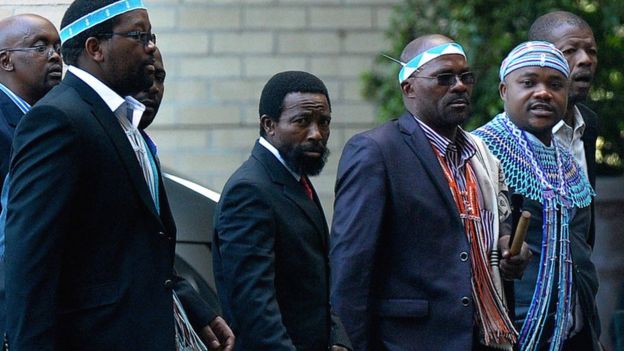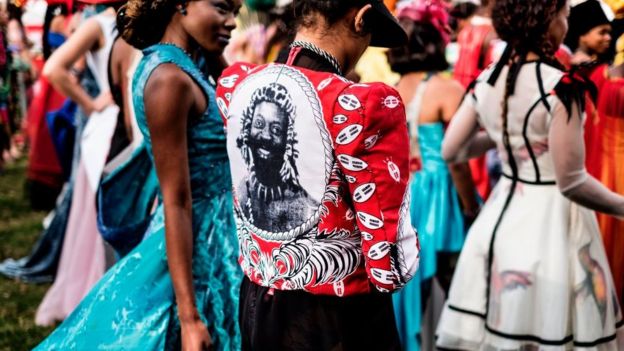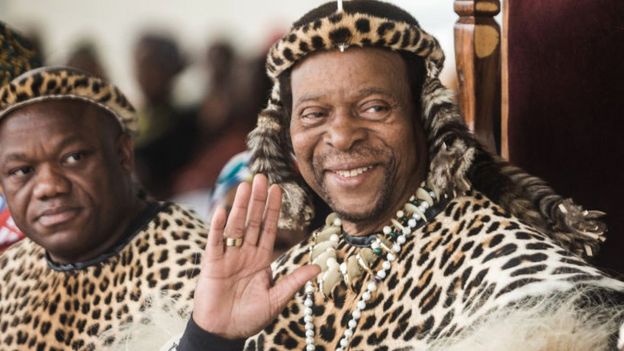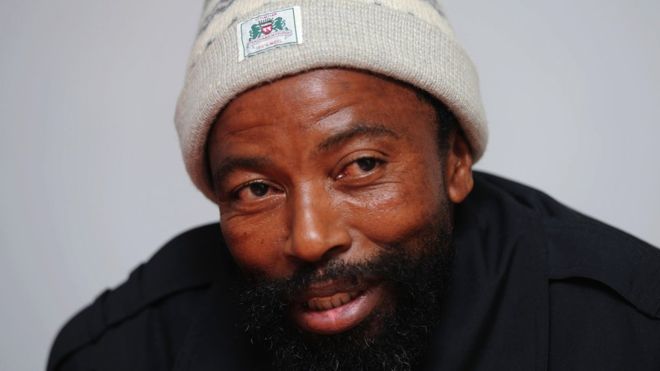A South African king, a nephew of the late Nelson Mandela, has been arrested after allegedly going on the rampage with an axe in the palace.
Buyelekhaya Dalindyebo, freed from jail on parole in December, broke into the Thembu royal palace in the early hours.
Witnesses said he was searching for his son, the regent, who was appointed the acting monarch while he was in prison.
The regent escaped through a window, but his wife has been injured and taken to hospital, a royal spokesman said.
King Dalindyebo was sentenced to 12 years in jail for kidnapping, assault and arson, but only served four years after the president granted some prisoners early parole last year.
He was the first monarch to be convicted of a crime in South Africa since white-minority rule ended in 1994.
The 56-year-old comes from the Thembu clan, to which Mr Mandela, South Africa's first black president, belonged.
South Africa has seven officially recognised monarchs representing different ethnic groups and clans.
'People were running for their lives'
Since King Dalindyebo's release from jail, there have been tensions in the Thembu royal family and he has refused to see his son, acting King Azenathi Zanelizwe Dalindyebo.
Last month, the royal household decided that Azenathi should continue on as regent for at least another year, South Africa's City Press paper reported.

Royal spokesman Prince Siganyeko Dalindyebo said the king had broken into the palace - Bumbane Great Place, just outside the town of Mthatha in Eastern Cape Province - at around 03:00 local time (01:00 GMT) on Friday morning.
"He was carrying weapons such as [an] axe, a machete and also a crowbar. He managed to break a window from the sitting room of the main house," he told public broadcaster SABC.
"As he was moving up the stairs looking for the acting king, some people managed to distract him and then the acting king managed to jump out of a window, running for safety."

Other people were also running for their lives, the prince said.
"He has wreaked havoc in the palace… he started ransacking the king's room, all confidential documents - he threw them around."
Video footage shows the troubled monarch later standing outside his palace, calmly smoking a cigarette, and daring the police to arrest him, which they eventually did.
The king was jailed in 2015 after being convicted of assaulting his subjects during a "reign of terror" in the 1990s.
He had kidnapped a woman and her six children, set their home on fire and beaten up four youths, one of whom died because one of their relatives had failed to present himself before the king's traditional court.

If his behaviour has often proved extreme, it nonetheless poses some fundamental questions about the role of traditional leaders in modern, post-apartheid South Africa: their entitlements, public funding, the feudal nature of their control and, above all, in this case, the extent to which their royal titles grant them impunity.
As well as the formally recognised monarchs, South Africa has thousands of other traditional leaders - headmen and chiefs - who continue to enjoy widespread respect, particularly in rural areas, and who are often called to mediate in civil disputes within their clans.
During the decades of racial apartheid, the white-minority government sought to strengthen the role of royal families, seeking to play them off against the broader and much more threatening liberation movement led by the African National Congress (ANC).

But in recent years - and after multiple royal scandals - some South Africans have begun to question the sustainability of the traditional system, not least when it comes to issues like the semi-feudal control that Zulu King Goodwill Zwelithini still enjoys over vast areas of land that he rents out to his subjects.
King Zwelithini - whose outspoken views on immigrants and sex education along with his lavish lifestyle have often been criticised - has, like King Dalindyebo, repeatedly challenged the authority of South Africa's democratic government.
The country's royal families face no immediate challenge to their authority, and many South Africans may shrug off King Dalindyebo as an embarrassing outlier.
But after this latest incident, plenty of people will be watching closely to see how fairly, or leniently, he will be treated by prosecutors.
Latest Stories
-
Expansion Drive: Takoradi Technical University increases faculties
1 hour -
SHS heads demand payment of outstanding funds before reopening of schools
2 hours -
We thank God for the 2024 general elections – Akufo-Addo
2 hours -
Coconut Grove Beach Resort marks 30 years of excellence with memorable 9 lessons & carols service
2 hours -
WAFU B U-17 Girls’ Cup: Black Maidens beat Nigeria on penalties to win inaugral tournament
3 hours -
Real Madrid beat Sevilla to keep pressure on leaders Atletico
4 hours -
Liverpool put six past Spurs to go four points clear
4 hours -
Manchester United lose 3-0 at home to Bournemouth yet again
4 hours -
CHAN 2024Q: ‘It’s still an open game’ – Didi on Ghana’s draw with Nigeria
4 hours -
CHAN 2024Q: Ghana’s Black Galaxies held by Nigeria in first-leg tie
5 hours -
Dr Nduom hopeful defunct GN bank will be restored under Mahama administration
6 hours -
Bridget Bonnie celebrates NDC Victory, champions hope for women and youth
6 hours -
Shamima Muslim urges youth to lead Ghana’s renewal at 18Plus4NDC anniversary
7 hours -
Akufo-Addo condemns post-election violence, blames NDC
7 hours -
DAMC, Free Food Company, to distribute 10,000 packs of food to street kids
8 hours

